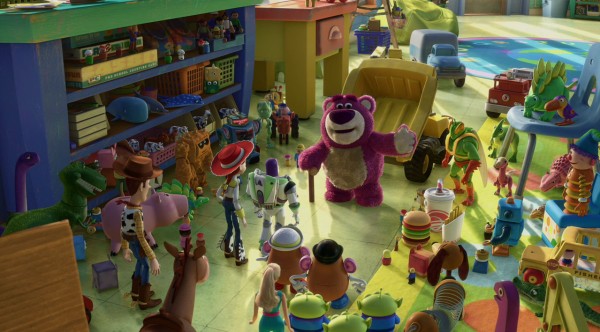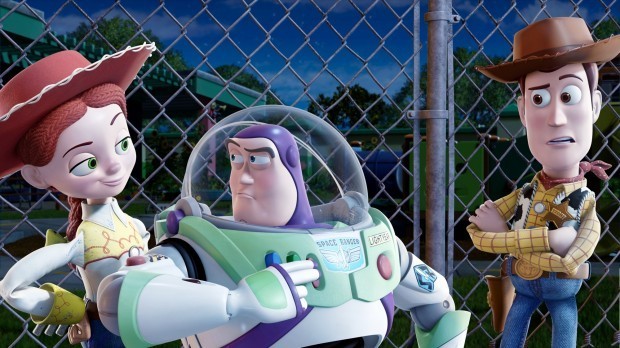
Director: Lee Unkrich, 2010. (G)
Fifteen-years ago, Pixar has come a long way from its first fantastic film, Toy Story, that captured our attention. But they continued to exceed the bar, with films like Toy Story 2, Monsters Inc, The Incredibles, and most recently Wall-E and Up. It seems that with each new creation they have outdone their best. All of their 10 previous films earned at least one Oscar nomination with 7 of them carrying home a trophy. This 11th feature had quite a tradition to keep up. Not only that, but it is the sequel to a sequel, normally a bad sign indicating a studio out of creative ideas, wanting to milk some more cash out of an audience with a rerun tale. Not so here. The storyline is fresh while retaining most of the original cast and introducing some new characters. It pulls off the difficult task of standing alongide its predecessors, carrying its own story, and bringing the trilogy to a satisfying conclusion. At the same time, it is a 5-heart barrel of fun that ranks up there with the best of Pixar's earlier films.
The film opens with an action sequence featuring Woody (voice of Tom Hanks) and Jessie (voice of Joan Cusack) on horseback chasing a train being robbed by evil bandits.This could have been taken straight from an old-fashioned Western . . . at least until spaceman Buzz Lightyear (voice of Tim Allen) intervenes. But all this introduction brings back memories of the first film. Then we see this is actually the imagination of young Andy (voice of John Morris) as he plays intently and lovingly with his toys.
As Randy Newman sings the signature tune, the film moves ahead 10 years and Andy is now a high school graduate and preparing for college. Significantly, Newman sings, "As the years go by, our friendship will never die." Here is the key question Toy Story 3 is trying to answer: will toys simply be discarded when the owner grows up? Or is there a friendship, a connection, that is deeper, longer-lasting? How should the toys handle this dilemma? Beside some other themes developed along the way, Unkrich offers three answers to this problem, from the perspective of the toys themselves. Yet we can mine some nuggets for our own relationships as well.
When Andy's mom tells him he must clear out his toys, either depositing them in the attic, discarding them as trash, or donating them to a daycare, the toys realize their predicament. And the scene is set. The toy soldiers offer the first perspective. Telling the other toys, "We done our duty," they pop parachutes and jump out the window to float away to freedom.
Their response points to an obligation. They may have been Andy's toys but their duty was simply to bring him entertainment, some fun. This is akin to a business relationship. Their job is to serve. When that job is done, they have no long-term commitment to the master, the owner. Most jobs are like this today. We work, putting in the hours, to serve a boss who may be personally unaware of who we are or what we do. Regardless, as followers of Jesus we do work hard with good attitudes as if we are serving the Lord (Eph. 6:5-8). Yet often when we grow up and retire, or they grow up and realize they don't need us anymore, we are cut loose. Our parachutes may include an attractive layoff package, a golden parachute if we are an executive, or simply a box of our possessions if we are really unlucky. But when we exit the building or jump out the window, that is the last we will ever see of that boss and that job. We don't care enough to want to spend any more time with him or her. It is a relationship, but commercial and superficial.
Through a series of accidents, the discarded toys find themselves donated to Sunshine Daycare, and are at least glad to be together. Here is the second perspective: "The important thing is to stick together." We find this in other business relationships. Sometimes when people retire or leave, they enjoy their fellow employees or staff members so much that they miss the camaraderie. They may not miss the boss or employer, but they have significant friendships that last beyond the termination of employment. We see this when retirees volunteer back at the company. We see more when retirees meet regularly for coffee or lunch weekly or monthly. Their job may be over. But some relationships persist. They want to continue to be together, in one form or another.
 On their first day in their new "home" the toys meet the new leader of the toys, a cuddly, strawberry-scented bear called "Lots-o-hugging-bear", nicknamed Lotso (voice of Ned Beatty). He is soft-spoken and appears to be a caring grandfatherly type, tottering around on a cane with some other toys as helpers. This couldn't be further from the truth. He is a tyrant, running the place with an iron rule, keeping the new toys in their place: the Caterpillar Room, where unsupervised toddlers trash them and all-but-destroy them . . . on a daily basis.
On their first day in their new "home" the toys meet the new leader of the toys, a cuddly, strawberry-scented bear called "Lots-o-hugging-bear", nicknamed Lotso (voice of Ned Beatty). He is soft-spoken and appears to be a caring grandfatherly type, tottering around on a cane with some other toys as helpers. This couldn't be further from the truth. He is a tyrant, running the place with an iron rule, keeping the new toys in their place: the Caterpillar Room, where unsupervised toddlers trash them and all-but-destroy them . . . on a daily basis.Lotso brings up the theme of appearances. Appearances can be, and often are, deceptive. He seems so nice but is inwardly nasty. Lucifer is like this, too. He appears as an angel of light (2 Cor. 11:4) but in reality is the prince of darkness. We are drawn to what we think we see, not always being discerning enough to look beyond the surface image. The devil knows this and plays to this aspect of our fallen nature. He presents us with temptations we are likely to fall for, and then once we have taken the bait he reels us in. We can and must be shrewder than a serpent (Matt. 10:16) in our ongoing battle with Satan.
 Woody, though, is a special favorite of Andy's, who wants to take him to college. This cowboy toy must escape the confines of the daycare center and find his way back to Andy's home. His plan falls afoul and gets carried away by the wind; he finds himself in the care of a new owner. Here we meet some new toys, including a thespian hedgehog named Mr Pricklepants and another dinosaur Trixie. Perhaps the best pair of new toy characters are Barbie and Ken. Their lines are a hoot. Ken (voice of Michael Keaton) declares, when he first spies Barbie, "It's like we were made for each other!" Barbie (voice of Jodi Benson), on the other hand, shows she is more than just a pretty figure, with her understanding of modes of government, "Authority should derive from the consent of the governed, not from the threat of force!"
Woody, though, is a special favorite of Andy's, who wants to take him to college. This cowboy toy must escape the confines of the daycare center and find his way back to Andy's home. His plan falls afoul and gets carried away by the wind; he finds himself in the care of a new owner. Here we meet some new toys, including a thespian hedgehog named Mr Pricklepants and another dinosaur Trixie. Perhaps the best pair of new toy characters are Barbie and Ken. Their lines are a hoot. Ken (voice of Michael Keaton) declares, when he first spies Barbie, "It's like we were made for each other!" Barbie (voice of Jodi Benson), on the other hand, shows she is more than just a pretty figure, with her understanding of modes of government, "Authority should derive from the consent of the governed, not from the threat of force!"Eventually Woody realizes he must return to save his friends whatever the cost. Like the motto of the US Marines, the tagline for Toy Story 3 is driven home: no toy left behind! And that brings us to the second half of the film: it becomes an escape movie. Much like The Great Escape, the toys are prisoners in a compound that is guarded like a POW camp. Pixar brings a heightened sense of suspense, surprisingly so for a G-rated movie focused on children and families.
 Woody himself offers the third perspective on growing up. Andy says, "Now Woody, he's been my pal for as long as I can remember. He's brave, like a cowboy should be. And kind, and smart. But the thing that makes Woody special, is he'll never give up on you... ever. He'll be there for you, no matter what." His view is that toys like him are supposed to keep on loving their owners forever, even when they are about to be discarded because they have been outgrown.
Woody himself offers the third perspective on growing up. Andy says, "Now Woody, he's been my pal for as long as I can remember. He's brave, like a cowboy should be. And kind, and smart. But the thing that makes Woody special, is he'll never give up on you... ever. He'll be there for you, no matter what." His view is that toys like him are supposed to keep on loving their owners forever, even when they are about to be discarded because they have been outgrown.This is a deep theme, pointing beyond the casual business relationships we have explored in the prior two perspectives. This is more profound. It points towards an agape love that is sacrificial and focused entirely on the other, the one being loved.
To switch the parallel, God is like this. He loves us sacrificially, having given the life of his son for us (Jn. 3:16). And he goes on loving us, never giving up on us. "His love endures forever" (Psa. 136:1). Nothing can separate us from this love (Rom. 8:38-39). He is there for us always, no matter what. We might at times grow tired of God. Perhaps we feel disappointed with how life has turned out and blame God for this. We pull back from him, tiring of him for a time. But he never leaves us. God will never leave us or forsake us (Deut. 31:6), though we might wish he would. As Woody keeps coming back for Andy, so God will keep coming back for us.
We might graduate college, we might retire from our job, but no matter what age we are and how grown up we become, we never outgrow God.
All three perspectives on the toys' jobs offer a part of the truth. But which makes most sense and is most complete? Life is more than commercial relationships. It is more than friendship. It is founded on love, a love from God and a love for God. Have you found that love?
Copyright ©2010, Martin Baggs


No comments:
Post a Comment